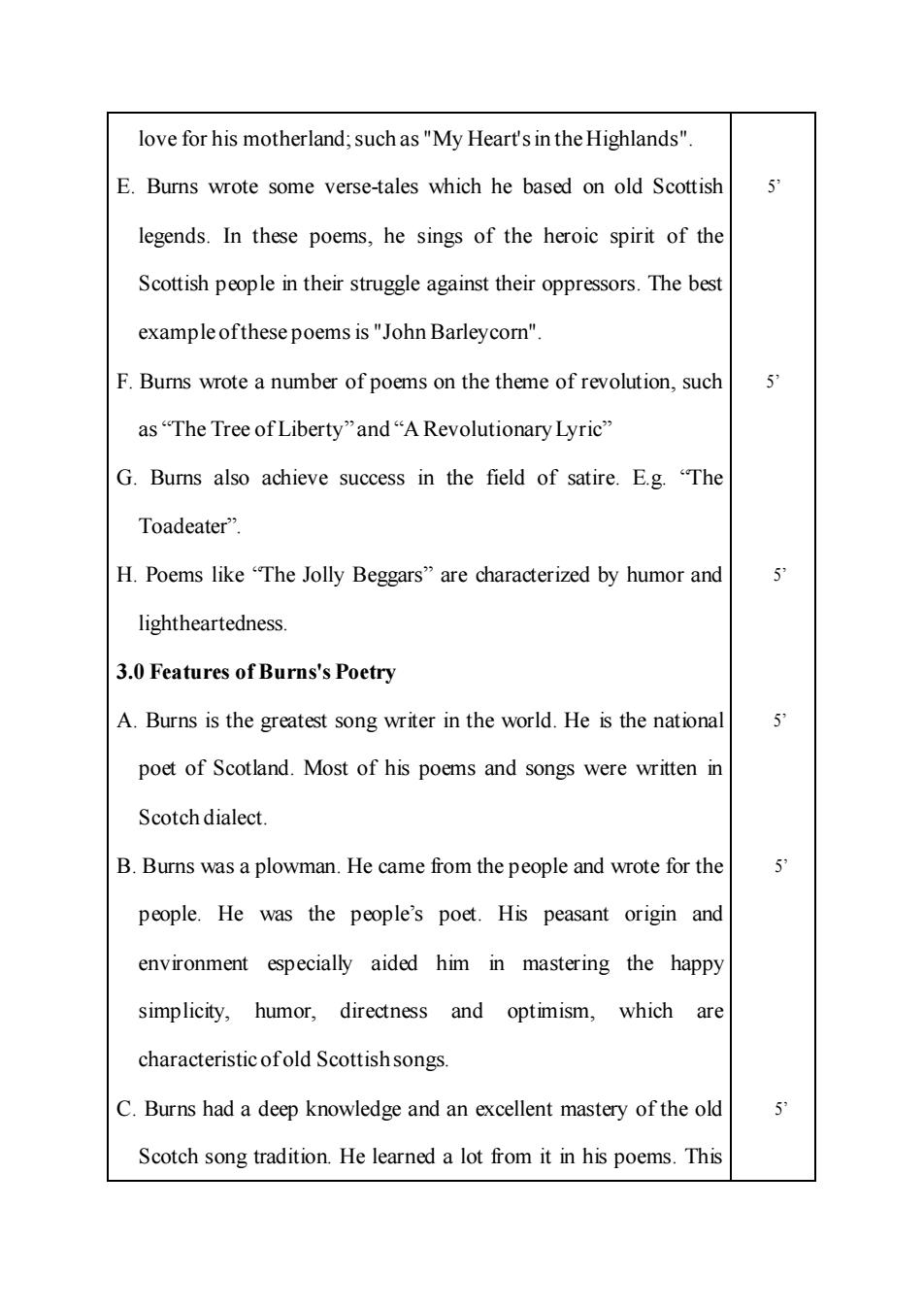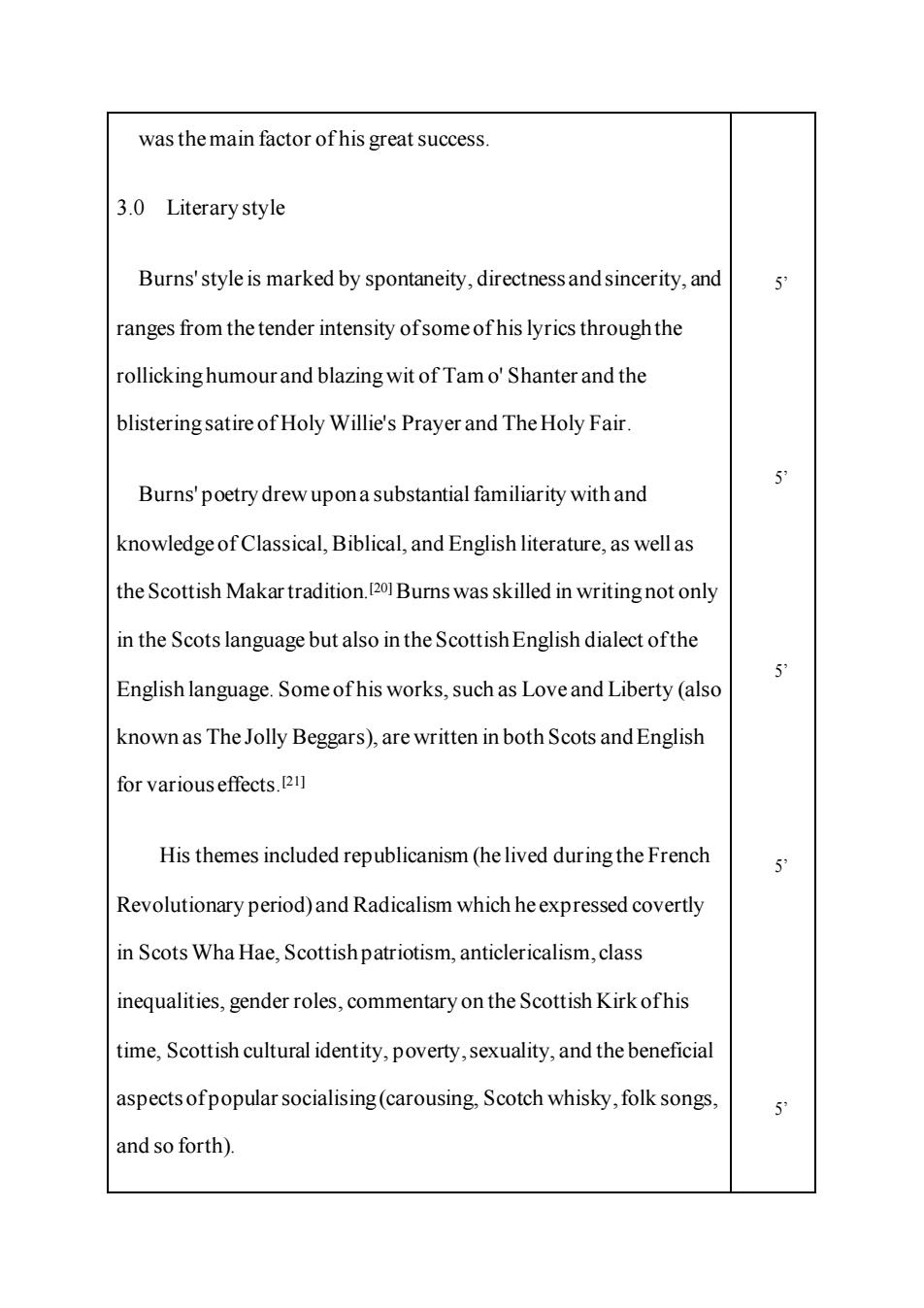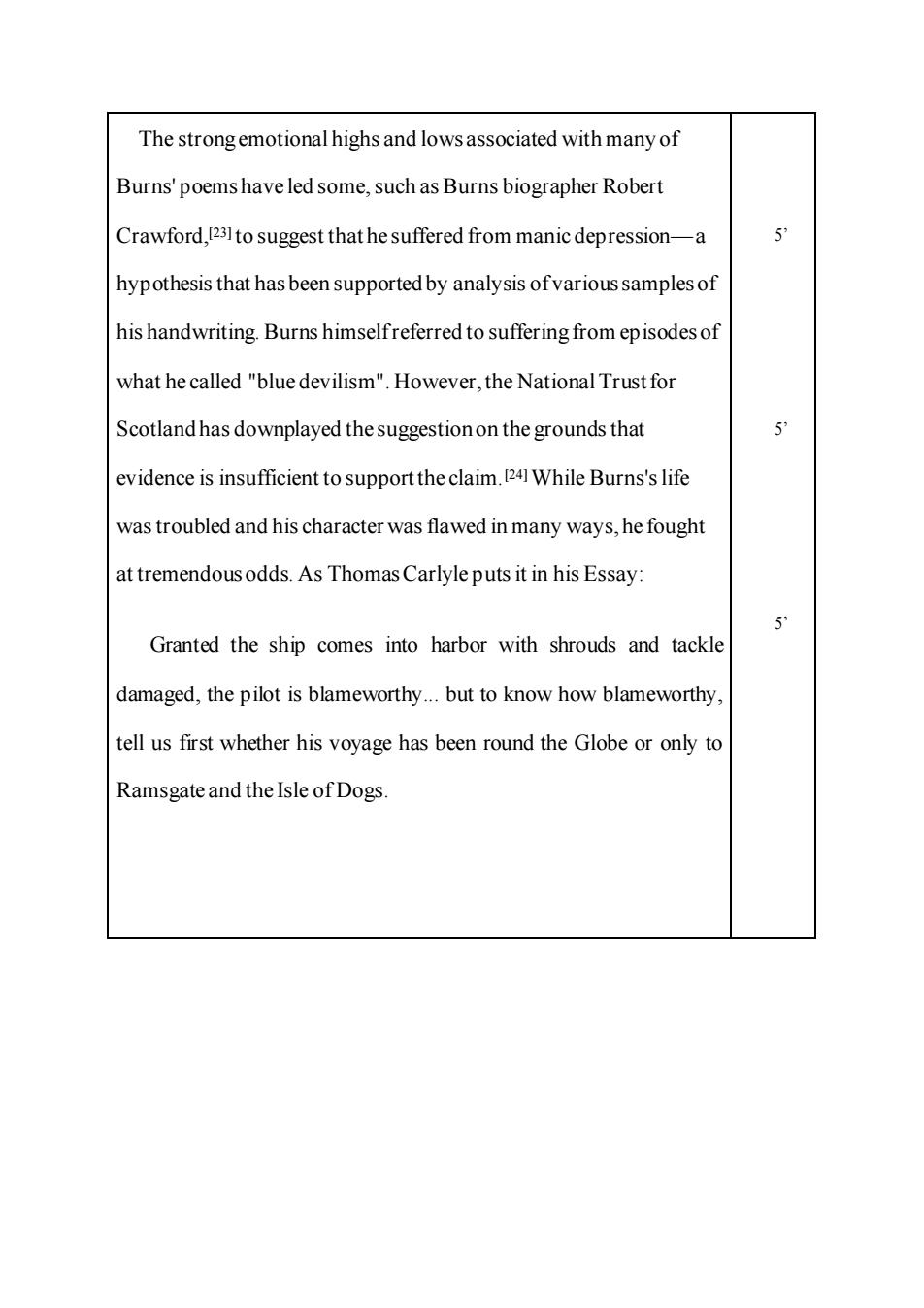
教 案 课程名称 英因文学 授课专业及层次 授课内容 Lecture eighteen: Introduction to Robert Burns 学时数 2 To let the students see the significance of literature. 教学目的 Tolet thestudentshave the To let the students get basic knowledge of British literature To get to know the general clue of British literary history 重点 To get to know the important British writers and literary works 难点 To get to know some key terms Toknowsomemthods for irry appretonandiism 自学内容 Additional reading materials about the western cultural background 使用教具 Projector,audio-video machine 相关学科知识 Western culture and general Literary theories Open questions and answers in class 教学法Class discussion and analysis 讲授内容纲要、要求及时间分配 Robert Burns(1759-1796) 1.0Life Burns was born in 1759,Scotland.He was the eldest son of a poor Scotch peasant family.Burns got only a little schooling He had a great passion for Scottish folk songs and an intimate knowledge of Scottish poets and their works.When he was 16,he became the principal laborer on the farm,but his interest in poetry developed and he already started writing some poems.When he was 27,he resolved to go abroad.He gathered together some of his early poems and published them under the title of "Poems Chiefly in the Scottish 5 Dialect".The collection was a great success and took all Scotland by
教 案 课程名称 英国文学 授课专业及层次 授课内容 Lecture eighteen: Introduction to Robert Burns 学时数 2 教学目的 To let the students see the significance of literature; To let the students have the general impression of British literature. To let the students get basic knowledge of British literature 重 点 To get to know the general clue of British literary history To get to know the important British writers and literary works 难 点 To get to know some key terms To know some methods for literary appreciation and criticism 自学内容 Additional reading materials about the western cultural background 使用教具 Projector, audio-video machine 相关学科知识 Western culture and general Literary theories 教 学 法 Open questions and answers in class Class discussion and analysis 讲授内容纲要、要求及时间分配 Robert Burns (1759-1796) 1.0 Life Burns was born in 1759, Scotland. He was the eldest son of a poor Scotch peasant family. Burns got only a little schooling. He had a great passion for Scottish folk songs and an intimate knowledge of Scottish poets and their works. When he was 16, he became the principal laborer on the farm, but his interest in poetry developed and he already started writing some poems. When he was 27, he resolved to go abroad. He gathered together some of his early poems and published them under the title of "Poems Chiefly in the Scottish Dialect". The collection was a great success and took all Scotland by 5’ 5’

storm.Encouraged by the success of his collection,Burns decided to give up his journey abroad and went to Edinburgh to arrange for another edition of his poems.He was welcomed and feasted by the 5 best ofthe Scottish society.But nobody gave him real help,and very soon he found himself looked down upon in the aristocratic circles Then he left the city in anger and disappointment. In 1788,he married his sweetheart Jean Armour. The last few years of the poet's life was a tragedy.Though he 5' was appointed to be the collector of liquor revenues,he could only get a small salary,and he still lived in poverty.His support for the French Revolution brought him much trouble.In 1796,when he was only 37 yearsold,he died 2.0 Burns's Poetry 5 A.Robert Burns is remembered mainly for his songs written in Scottishdialect on a variety ofsubject. B.Most of Burns's poems are lyrics on love and friendship.They have a great charm of simplicity.His best-known lyrics are "A Red,Red Rose",and"Auld Lang Syne". C.Burns wrote some poems to express his hatred for the oppression 5 of the ruling class and his love for freedom.A best-known poem of this kind is "A Man's A Man for That" D.Burns wrote some patriotic poems,in which he expresses his deep
storm. Encouraged by the success of his collection, Burns decided to give up his journey abroad and went to Edinburgh to arrange for another edition of his poems. He was welcomed and feasted by the best of the Scottish society. But nobody gave him real help, and very soon he found himself looked down upon in the aristocratic circles. Then he left the city in anger and disappointment. In 1788, he married his sweetheart Jean Armour. The last few years of the poet's life was a tragedy. Though he was appointed to be the collector of liquor revenues, he could only get a small salary, and he still lived in poverty. His support for the French Revolution brought him much trouble. In 1796, when he was only 37 years old, he died. 2.0 Burns's Poetry A. Robert Burns is remembered mainly for his songs written in Scottish dialect on a variety of subject. B. Most of Burns’s poems are lyrics on love and friendship. They have a great charm of simplicity. His best-known lyrics are "A Red, Red Rose", and "Auld Lang Syne". C. Burns wrote some poems to express his hatred for the oppression of the ruling class and his love for freedom. A best-known poem of this kind is "A Man's A Man for That". D. Burns wrote some patriotic poems, in which he expresses his deep 5’ 5’ 5’ 5’

love for his motherland;suchas"My Heart's in the Highlands" E.Burns wrote some verse-tales which he based on old Scottish legends.In these poems,he sings of the heroic spirit of the Scottish people in their struggle against their oppressors.The best example ofthese poems is"John Barleycorn". F.Burns wrote a number of poems on the theme of revolution,such 51 as“The Tree of Liberty”and“A Revolutionary Lyric'” G.Burns also achieve success in the field of satire.E.g."The Toadeater'” H.Poems like"The Jolly Beggars"are characterized by humor and lightheartedness. 3.0 Features of Burns's Poetry A.Burns is the greatest song writer in the world.He is the national poet of Scotland.Most of his poems and songs were written in Scotch dialect. B.Burns was a plowman.He came from the people and wrote for the people.He was the people's poet.His peasant origin and environment especially aided him in mastering the happy simplicity,humor,directness and optimism,which are characteristic ofold Scottishsongs. C.Burns had a deep knowledge and an excellent mastery of the old 5 Scotch song tradition.He learned a lot from it in his poems.This
love for his motherland; such as "My Heart's in the Highlands". E. Burns wrote some verse-tales which he based on old Scottish legends. In these poems, he sings of the heroic spirit of the Scottish people in their struggle against their oppressors. The best example of these poems is "John Barleycorn". F. Burns wrote a number of poems on the theme of revolution, such as “The Tree of Liberty” and “A Revolutionary Lyric” G. Burns also achieve success in the field of satire. E.g. “The Toadeater”. H. Poems like “The Jolly Beggars” are characterized by humor and lightheartedness. 3.0 Features of Burns's Poetry A. Burns is the greatest song writer in the world. He is the national poet of Scotland. Most of his poems and songs were written in Scotch dialect. B. Burns was a plowman. He came from the people and wrote for the people. He was the people’s poet. His peasant origin and environment especially aided him in mastering the happy simplicity, humor, directness and optimism, which are characteristic of old Scottish songs. C. Burns had a deep knowledge and an excellent mastery of the old Scotch song tradition. He learned a lot from it in his poems. This 5’ 5’ 5’ 5’ 5’ 5’

was the main factor ofhis great success 3.0 Literary style Burns'style is marked by spontaneity,directness and sincerity,and 5 ranges from the tender intensity ofsome ofhis lyrics throughthe rollicking humour and blazing wit of Tam o'Shanter and the blistering satire of Holy Willie's Prayer and The Holy Fair. 5 Burns'poetry drew upona substantial familiarity with and knowledge of Classical,Biblical,and English literature,as well as the Scottish Makar tradition.201 Burns was skilled in writing not only in the Scots language but also in the Scottish English dialect ofthe English language.Some ofhis works.such as Love and Liberty(also known as The Jolly Beggars),are written in both Scots and English for various effects.1 His themes included republicanism(he lived during the French 5 Revolutionary period)and Radicalism which heexpressed covertly in Scots Wha Hae,Scottishpatriotism,anticlericalism,class inequalities,gender roles,commentary on the Scottish Kirk ofhis time,Scottish cultural identity,poverty,sexuality,and the beneficial aspects ofpopular socialising(carousing,Scotch whisky,folk songs. and so forth)
was the main factor of his great success. 3.0 Literary style Burns' style is marked by spontaneity, directness and sincerity, and ranges from the tender intensity of some of his lyrics through the rollicking humour and blazing wit of Tam o' Shanter and the blistering satire of Holy Willie's Prayer and The Holy Fair. Burns' poetry drew upon a substantial familiarity with and knowledge of Classical, Biblical, and English literature, as well as the Scottish Makartradition.[20]Burns was skilled in writing not only in the Scots language but also in the Scottish English dialect of the English language. Some of his works, such as Love and Liberty (also known as The Jolly Beggars), are written in both Scots and English for various effects.[21] His themes included republicanism (he lived during the French Revolutionary period) and Radicalism which he expressed covertly in Scots Wha Hae, Scottish patriotism, anticlericalism, class inequalities, gender roles, commentary on the Scottish Kirk of his time, Scottish cultural identity, poverty, sexuality, and the beneficial aspects of popular socialising (carousing, Scotch whisky, folk songs, and so forth). 5’ 5’ 5’ 5’ 5’

The strongemotional highs and lows associated with many of Burns'poems have led some,such as Burns biographer Robert Crawford,231to suggest that he suffered from manic depression-a 5 hypothesis that has been supported by analysis ofvarious samples of his handwriting.Burns himselfreferred to suffering from episodes of what he called "blue devilism".However,the National Trust for Scotland has downplayed the suggestionon the grounds that 5 evidence is insufficient to support the claim.1241 While Burns's life was troubled and his character was flawed in many ways,he fought at tremendous odds.As Thomas Carlyle puts it in his Essay: 5 Granted the ship comes into harbor with shrouds and tackle damaged,the pilot is blameworthy.but to know how blameworthy tell us first whether his voyage has been round the Globe or only to Ramsgate and the Isle of Dogs
The strong emotional highs and lows associated with many of Burns' poems have led some, such as Burns biographer Robert Crawford,[23] to suggest that he suffered from manic depression—a hypothesis that has been supported by analysis of various samples of his handwriting. Burns himself referred to suffering from episodes of what he called "blue devilism". However, the National Trust for Scotland has downplayed the suggestion on the grounds that evidence is insufficient to support the claim.[24] While Burns's life was troubled and his character was flawed in many ways, he fought at tremendous odds. As Thomas Carlyle puts it in his Essay: Granted the ship comes into harbor with shrouds and tackle damaged, the pilot is blameworthy. but to know how blameworthy, tell us first whether his voyage has been round the Globe or only to Ramsgate and the Isle of Dogs. 5’ 5’ 5’